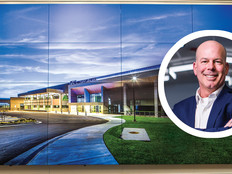Junior Gunner Kimball typically gets to Johnsburg High School around 7 a.m., but by 7:30 he’s heading out the door again. Kimball makes this quick departure because he participates in a dual-credit program through Illinois’s College of Lake County. A bus takes him and other participants to the college’s Advanced Technology Center, where they’re learning trade skills.
CLC built the Advanced Technology Center to prepare students for industrial careers, specifically in manufacturing.
“We could see a limit in terms of the supply we could create to establish a skilled workforce pipeline for the manufacturing sector,” says Lori Suddick, president of the College of Lake County. “The manufacturing sector in Lake County is strong, and it’s a necessary sector for the economic growth and sustainability of the communities that we serve.”
DIVE DEEPER: Colleges aim to fill workforce needs with tech training centers.
The college partnered with local high schools as part of the dual-credit program, providing an opportunity for students to earn college credits tuition free.
“Last year alone, we served over 2,200 dual-credit students and saved families $1.5 million in tuition and fees,” says Ali O’Brien, the college’s vice president of community and workforce partnerships. “The very first students to walk through the doors at the Advanced Technology Center and put their hands on the equipment in this industrial technology lab were our high school dual-credit students.”
The students get to work with industry-specific manufacturing equipment and advanced technologies, all aimed at helping prepare them for the workforce they’ll be entering.
Equipped for the Future of the Industry
Evolving like many other industries, manufacturing relies on advanced technologies for its processes and procedures.
“Manufacturing is a changing industry,” Suddick says. “It has advanced into Industry 4.0, which is the digitalization and automation of the industry.”
Students need to be prepared for these technological advances to gain a proper foothold in the job market they’ll enter after graduation.
“This center establishes a place that ensures we are producing highly skilled graduates who are competent to exist within that Industry 4.0 sector,” Suddick adds.
“Manufacturing equipment today isn’t just plug in and use. It is networked. It sends data into the cloud,” O’Brien says.
The College of Lake County’s Advanced Technology Center is equipped with modern networking solutions that support this. The building holds 25,000 feet of CAT 5e cabling, as well as 132 wireless access points and Cisco switches. This ensures students can always connect to the network with their devices.
Click the banner below to learn how to keep you staff and students connected.
“Each of the dual-credit high school students has their own laptop that they log into every day,” says David Wooten, instructor of the industrial technology program at the College of Lake County.
“We use the computers that the CLC provided for a good majority of the extra learning work that we do,” Kimball says. “We do all of the online work on those computers, and we use Google Docs a lot for study guides.”
Students aren’t using the devices just for traditional online schoolwork, however. The computers play a key role in preparing them for Industry 4.0.
“These computers will run any of the specialized pieces of software we need to do our capstone projects, to run our Amatrol learning management system, to run AutoCAD. We’re teaching our students all the cutting-edge programs in the manufacturing industry,” Wooten says.










